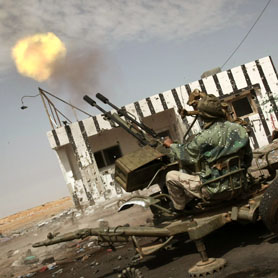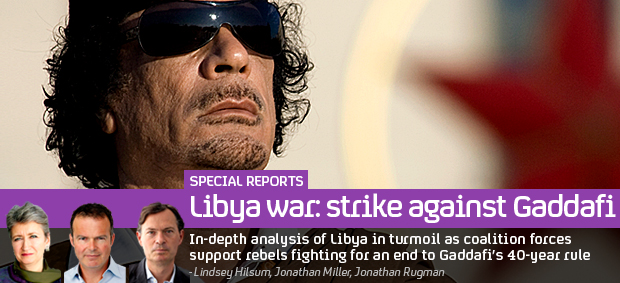France ‘won’t rule out’ more Libyan weapon drops
A senior French diplomat tells Channel 4 News a weapon drop to rebel-held areas was a legally-justified move to protect civilians, and that France won’t rule out deploying more arms in the future.

The French newspaper Le Figaro claims that several tonnes of arms – including assault rifles, anti-tank rockets and light armoured vehicles – were dropped around rebel-held towns in the Nafusa mountains, around 100 km south of the capital Tripoli.
France has denied sending several tonnes but has revealed that weapons were dropped in rebel-held areas.
It is the first time that a Nato member has openly admitted arming rebels, although Qatar has been accused of supplying arms to opposition fighters on a larger scale.
A senior French diplomatic source who wished to remain nameless told Channel 4 News that the weapon drop “was an operational decision taken at the time to help civilians who were in in imminent danger. A group of civilians were about to be massacred so we took the decision to provide self-defensive weapons to protect those civilian populations under threat.”
“It was entirely justifiable legally, resolution 1970 and 1973 were followed to the letter and it can be assured that there will be no diplomatic crisis despite what the African Union and Russia may say,” the diplomat said.
“France will not rule out more weapon drops in the future.” Senior French diplomat
“France will not rule out more weapon drops in the future as we will take every decision on a case by case basis,” he added.
But Colonel Thierry Burkhard, the spokesman for the French military, told Channel 4 News that there are no further plans for more weapon drops.
He added that the weapon drop happened at the beginning of June in the Djebel Nafoussa area.
“During the dropping operations, non-combatants and some isolated forces opposed to the regime appeared to be in a very deteriorating situation, suffering from a harassing fire from the Gaddafi forces. That’s why, in addition to the humanitarian aid delivered, some self-defence light armament had also been delivered.”
According to Le Figaro, which said it had seen a secret intelligence memo and talked to well-placed officials, the drops were designed to help rebel fighters encircle Tripoli and encourage a popular revolt in the city itself.
Nato Secretary General Anders Fogh Rasmussen said that the military alliance was not involved in the French airdrop operation.
Asked whether he knew of any other countries who were supplying weapons to rebel-held regions, Rasmussen said he had “no information”.
Russia – which abstained in March from voting on UN action to authorise military operations to protect civilians in Libya – has strongly criticised France.
“If this is confirmed, it is a very crude violation of UN Security Council resolution 1970,” Foreign Minister Sergei Lavrov said.
He added that Russia had formally requested information from France about the move, to check that it “corresponds with reality,” and is due to meet his French counterpart Alain Juppe in Moscow on Friday
African Union Commissioner Jean Ping, who chairs a meeting of African leaders in Malabo, Equatorial Guinea, on Thursday, said that weapons distributed in Libya would contribute to the “destabilisation” of African states.
“What worries us is not who is giving what, but simply that weapons are being distributed by all parties and to all parties. We already have proof that these weapons are in the hands of al-Qaeda, of traffickers,” said Ping.
UN resolution mandate
Paragraphs 9 and 10 of U.N. Security Council resolution 1970 from February imposed a comprehensive arms embargo on Libya.
But resolution 1973, which was adopted in March, authorised member states “to take all necessary measures” to protect civilians in Libya. It also adds that is “notwithstanding paragraph 9 of resolution 1970” – referring to the arms embargo.
Part of the UN resolution allows Nato the legal ability to provide weapons for protection or defence, but if those weapons are then used for attack, the rebels and those arming them could be taking part in illegal action.
Sir Richard Dalton – a senior diplomat who has been the UK’s ambassador to Iran, Libya, and the Palestinian Authority – told Channel 4 News that the weapon drop was a political decision that could be legally justified.
“One has to go back to the London Conference on Libya in March where the view taken by some powers was that it would be legal to arm the rebels given the mandate that authorises force to protect civilians,” Sir Hugh said.
“How it plays in New York at the Security Council is yet to be seen, and we may see some capitals being forced to rein themselves in given the objections of others,” he added.
